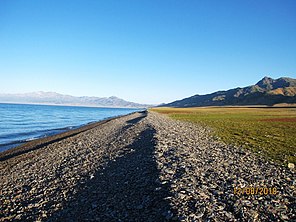| Sayram Lake | |
|---|---|
 Sayram Lake (2010) Sayram Lake (2010) | |
 | |
| Location | Bortala Prefecture, Xinjiang |
| Coordinates | 44°36′N 81°12′E / 44.6°N 81.2°E / 44.6; 81.2 |
| Basin countries | China |
| Surface area | 458 km (177 sq mi) |
| Surface elevation | 2,070 m (6,791 ft) |
Sayram Lake (Chinese: 赛里木湖; pinyin: Sàilǐmù hú; Kazakh: Сайрам көлі, romanized: Sairam köli; Mongolian: Сайрам нуур, romanized: Sairam nuur), also known as Santai Haizi (Chinese: 三台海子) or historically the "Clean Sea" (净海), is an endorheic freshwater lake in the northern Tianshan Mountains at Börtala Mongol Autonomous Prefecture, Xinjiang, China, less than 50 km (31 mi) from the border with Kazakhstan. The name Sayram originally derives from Kazakh, meaning "blessing".
The lake is the largest (458 km or 177 sq mi) and also the highest (at 2,070 m or 6,790 ft) alpine lake in Xinjiang, largely filled by glacial meltwater, residual precipitation from the Eurasian westerlies and runoffs from the surrounding mountain chains, as well as some groundwater springing and seepage. It is an AAAA National Scenic Area since 2010.
History
Sayram Lake is located along the northern branch of the historic Northern Silk Road. The mountainous region it belongs had been largely uninhabited throughout history, but the valleys east of it was historically settled by Saka nomads and various Tocharian people such as Jushi and Wusun, and later by the Göktürks and Oirat (Dzungar) Mongols. Around the lake, there are also archeological sites of various ancient rock arts, tombs and ruins of temples, ovoo, steles and stage stations from different dynasties.
Late Southern Song Taoist monk Qiu Chuji recorded in his famous travel journal that the lake as "spanning 200 li and surrounded by snowing summits", calling it a "heavenly pool". Other famous visitors such as Mongol Empire politician Yelü Chucai and Qing dynasty viceroy Lin Zexu (who was exiled to Xinjiang after the First Opium War) also recorded descriptions of the lake.
A local folktale relates that the lake was formed by a young Kazakh couple who had been separated by a demon, and were forced to jump into an abyss to be reunited. Their tears filled the abyss, forming the lake.
Biology
Sayram Lake is one of the most biodiverse region in Northwest China. Human activities are limited around the lake, and the unique wetland ecosystems around the lake exert significant importance to the hydrology and climate of northern Xinjiang.
Flora
The Sayram Lake region is home to 58 families, 288 genera and 639 species of seed plants, including three families and 8 species of gymnosperms and the remainder all being angiosperms. The usable land around the lake is predominantly steppes, although there have been large areas of grassland degradation since the 1980s.
Fauna
The native wildlife around Sayram Lake are steppe/desert fauna such as corsac fox and bobak marmot, and wetland waterbirds such as mallard and whooper swan. Originating from glacial cirques, there were originally no fish species in the lake. Stocking programs for coldwater fishes had taken place since 1976, though with poor results. Since the 1990s, 16 fish species, including salmonids such as peled and arctic cisco and cyprinids like ide, have been successfully introduced and naturalized into the lake. The lake is currently one of the most famous bases of coldwater aquaculture in China, with a dozen species being sold on the market.。
References
- 毛东雷; 金海龙 (2009). "新疆赛里木湖风景区深度开发构想" (PDF). 新疆师范大学学报(自然科学版). 28 (2). Archived from the original (PDF) on 2019-06-08. Retrieved 2019-05-26.
{{cite journal}}: CS1 maint: multiple names: authors list (link) - ^ 王树基. 关于赛里木湖的形成, 演变与第四纪古冰川作用的关系. 新疆地理. 1978;1(1):47-55.
- "概况详情". 赛里木湖景区官网. Archived from the original on 2019-08-04. Retrieved 2019-05-26.
- ^ 卢钟 (2016-02-15). "丘处机:果子沟第一诗". 伊犁新闻网. Archived from the original on 2019-06-03.
- ^ 艾克拜尔·米吉提 (2017-12-21). "赛里木湖随想". 中国政协传媒网. Archived from the original on 2019-06-08.
- 蔡景仙, ed. (2013-12-21). 中国古代帝师传 (in Chinese). 青苹果数据中心. Archived from the original on 2019-06-05. Retrieved 2019-05-26.
- Che, Muqi (1989). The Silk Road, past and present. Beijing, China: Foreign Languages Press. p. 158. ISBN 0-8351-2100-3. OCLC 22616168.
- Kwa, Yiqian (2009). One step from paradise : an adventure into northern Xinjiang. Singapore: Candid Creation Pub. p. 122. ISBN 978-981-08-2410-5. OCLC 310383372.
- Kuang, Wen Dong (1995). Focus on Xinjiang. Hong Kong China Tourism Press. ISBN 962-7799-25-4. OCLC 38278090.
- ^ 确·巴音其其克; 李建贵 (2018). "赛里木湖风景名胜区资源的保护管理". 绿色科技. 2 (2): 13-15. doi:10.16663/j.cnki.lskj.2018.02.007.
{{cite journal}}: CS1 maint: multiple names: authors list (link) - Zeng, Haiao; Wu, Jinglu; Liu, Wen (2014-02-13). "Two-century sedimentary record of heavy metal pollution from Lake Sayram: A deep mountain lake in central Tianshan, China". Quaternary International. Quaternary Research in Eastern and Central Eurasia: Geoarchaeology, Glaciation, Geomorphology, and Natural Hazards. 321: 125–131. doi:10.1016/j.quaint.2013.09.047. ISSN 1040-6182. Archived from the original on 2019-05-26. Retrieved 2019-05-26.
- 张铁 (2007-07-02). "塞里木湖景区牧民下山定居". 新疆林业 (2): 20. Archived from the original on 2019-06-06. Retrieved 2019-05-27.
- ^ 刘艳 (2016). "加强赛里木湖生态环境保护保障区域生态安全". 环境与可持续发展. 41 (4). doi:10.3969/j.issn.1673-288X.2016.04.063. Archived from the original on 2019-06-02. Retrieved 2019-05-26.
- ^ "新疆赛里木湖高体雅罗鱼生物学研究". Archived from the original on 2016-04-06. Retrieved 2016-03-21.
- ^ 李思忠,《黄河鱼类志:黄河鱼类专著及鱼类学文选》 Archived 2021-02-15 at the Wayback Machine,水产出版社,2015年,ISBN 9789578596771,第598页
External links
 Media related to Sayram Lake at Wikimedia Commons
Media related to Sayram Lake at Wikimedia Commons
This Xinjiang location article is a stub. You can help Misplaced Pages by expanding it. |